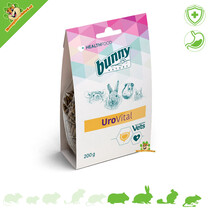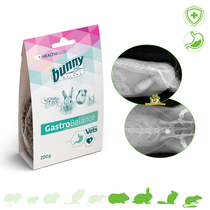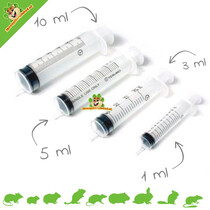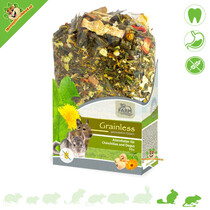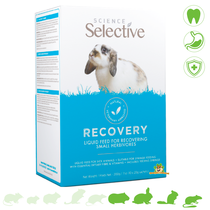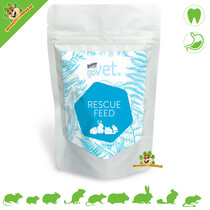Degoe food and natural Degoe food for Degoes in the Degoe Webshop!
BunnyNature Health UroVital is a nutritional supplement specially designed for guinea pigs, rabbits, chinchillas and degus with a sensitive or problematic urinary and bladder system. This supplement supports the urinary system.
Read moreDoes your beloved rodent or rabbit suffer from sensitive digestion and problems with gas formation? No problem! BunnyNature Gastro Balance is specially designed as a nutritional supplement to support them in times of digestive problems, such as indigestio
Read moreFeeding syringe 3-part, 1 ml. Suitable for feeding small animals. Thanks to this feeding syringe you can feed young (motherless) rodents. The syringe is also suitable for administering medication to your rodent.
Read moreRecoveryPlus is a complete, liquid food that provides intensive support to sick or recovering rabbits, guinea pigs, chinchillas and degus and can be administered. It aids in effective recovery from intestinal immobility and provides nutritional support du
Read more- Voor 17 uur besteld morgen in huis!*
- Persoonlijk & deskundig advies
- Al 13 jaar een begrip!
Discover the Pure Pampering for your Chinchilla and Degu with JR Farm Grainless Mix! Do you want to give your furry friends the very best nutrition? Then discover JR Farm Grainless Mix, the ultimate treat for your beloved Chinchilla and Degu. This nutriti
Read moreRecovery is a complete, liquid nutrition for sick or recovering small herbivores, which can be administered with a feeding syringe. It can be mixed with a little warm water to form an easy-to-feed paste and can be given to rabbits for a longer period of t
Read moreBunny Nature RescueFeed is special force-feeding that is also used by veterinarians for rodents & rabbits. This food supports the weakened body, thanks to the easily digestible fibers and optimal diversity of the composition, the animal quickly regains it
Read more
You can order Degoe food and natural Degoe food easily and quickly at DRD Knaagdierwinkel® the online Degoe Webshop!
Are you looking for food for your beloved Degus? Welcome to the online destination for high-quality dough food and natural dough food! At DRD Knaagdierwinkel Degoe Webshop you will find an extensive range of top brands, perfectly tailored to the specific needs of your degu. With us you can order different types and brands of degu food effortlessly and quickly. We understand how important it is to give your degu the right nutrition. Order today and give your little friend the tasty meals he deserves!
Natural Diet for Healthy Degus - Discover Our Offer!
Did you know that in the wild, degus enjoy grasses, herbs, bark, leaves and more? With us you will find high-quality hay as basic food, supplemented with low-energy, balanced chunks full of essential nutrients. Maintain a healthy diet with our natural dough food!
Folivore/herbivore = collective name for herbivorous animals that specialize in herbs and leaves.
In nature, degus eat grasses, herbs, bark, leaves, shrubs and wood. Degus need a plant-based diet that is rich in crude fiber and low in energy. A degu can also be fed fresh herbs, fresh grass or fresh vegetables of good quality. However, this is not a basic need. Basic food and unlimited hay are necessary. Degus are predisposed to diabetes. It is therefore better not to feed fruit and sugary vegetables. If degus are fed too much sugar and starch, the animals can develop diabetes. Degus require a high level of crude fiber. Different lengths of the fiber particles are important for the correct wearing of the teeth, the loosening of the gastrointestinal filling, good intestinal peristalsis and for the fermentation process in the appendix. For the degu that is kept as a pet, this means that the basic food for degus consists of high-quality hay and a low-energy, balanced, complete pellet. The kibble must contain all required nutrients, minerals, trace elements and vitamins.
A degu's gastrointestinal tract is not very muscular. To keep the digestive system going, food must be replenished again and again. To prevent digestive disturbances, it is important that the animals can eat at any time. To prevent the animals from becoming too fat, it is important to choose a diet that is adapted to the specific animal species.
Nutritional guide for food
Degus are herbivores. They naturally eat grasses, seeds, and dry plant parts. Degus need unlimited hay. This is important to get enough fiber. In addition, chewing hay contributes to good tooth wear. In addition to hay, degus need low-energy chunks that contain all the necessary nutrients, vitamins and minerals. They also need gnawing wood to wear down their teeth. Degus are naturally accustomed to a sparse diet. If they consume too much sugar, they quickly become overweight. Fruit is therefore not suitable for degus, as it contains too many natural sugars. In addition to hay, gnawing wood and degu chunks, vegetables and herbs can also be fed. It is important that a new vegetable is introduced carefully. Always start with a very small piece and you can then build up slowly. Also note that not all types of vegetables are safe for degus. Typical features of the herbivorous digestive system of the degu are the lifelong teeth and molars, the weakly muscled gastrointestinal tract and the appendix fermentation with the eating of the appendix droppings. In nature, degus spend a large part of the day consuming food. Eating breaks can cause digestive problems.
Diabetes Prevention and Digestive Health - Our Advice
Prevent diabetes in degus by avoiding sugary fruits and vegetables. Our nutritional guide recommends unlimited hay, in addition to low-energy chunks, to keep the digestive system active. Give your degu the best diet for a healthy life!
Balanced Diet - Fat, Calcium and Protein
The food should not be too greasy. Degus cannot digest fat well. Food containing sunflower seeds or peanuts, for example, is not suitable for degus because it contains too much fat.
Dough food should not contain too much calcium. An excess of calcium is excreted through the urinary tract. Too much calcium can cause bladder stones or kidney stones. Once a degu has bladder or kidney stones, they can no longer be dissolved with food. The animal will need to be operated on by a veterinarian. So it is very important to prevent this. However, a calcium deficiency is also not good. A degu does need calcium for its teeth and bones. Adult degus require a calcium content of 0.6%. For degus in growth this is 0.9%. The calcium phosphorus ratio should be between 1.5:1 and 2:1.
Strong Teeth and Chewing Pleasure - Fibers and Gnawing Wood
Fiber is crucial for dental health. Discover our food with a fiber content of approximately 20% and offer gnawing wood for healthy chewing pleasure. Keep your degu's teeth in top condition with our balanced diet.
The fiber content in degu food should be around 20%. Degus also get a lot of fiber from the hay. Structure-rich fibers from hay ensure that the degu has to chew long and persistently. This chewing causes the molars to wear down. This is very important because the molars continue to grow for life. Molars that are too long cause pain and can cause the degu to eat less hay, for example, with all the consequences for digestion. In addition, prolonged chewing ensures that enzymes in the saliva begin digestion. Fiber is also crucial for the fermentation process in the appendix.
Degu nutrition & Protein
The appendix stool of the degu is rich in protein. This is then eaten again after which the proteins can be digested. Too high a protein content in the diet can prevent the degu from eating the appendix stool. This can have negative consequences for health and digestion.
Natural Treats - Approved Plant List
Stimulate your degu's natural taste buds with our list of approved plants. From Strawberry Leaf to Sunflower, offer a varied diet to your little friend!
Wild Plants |
Branches and Leaves |
Vegetable |
|---|---|---|
| Strawberry leaf Bindweed Amaranth Mountain savory Mugwort Buckwheat Chives Nettle (dried) Goldenrod Canadian fleabane Wild garlic Deadnettle Yarrow Speedwell Angelica Cow parsley Great wall Plantain Cat's tail Big poppy Common agrimony Marigold Just pig grass Ordinary rocket Common hogweed Hedge bindweed Horsetail Herik Box peat Ground trot Shepherd's purse Hop Hawkweed Hornflower Deer hay Hedge vetch Incarnate clover Japanese knotweed Mallow/Malva Chamomile Cleavers Nodding nailwort Knapweed Knapweed Cucumber herb Compass lettuce Queen's herb Rapeseed Cornflower blue Cornflower Red Coltsfoot Clover Wood sorrel Burdock Look-without-look Lathyrus violet Daisy Margriet Report Milk Thistle/Milk Thistle Avensis Cranesbill Dandelion Bee bread Arrowwort cherry Penningwort Burnet Roller clover Comfrey coleus Stripe seed Narrow plantain Evening primrose Torch Valerian Lamb's lettuce Field cherry Five-fingerwort Fodder vetch Chickweed Flax Snapdragon Lady's mantle Bedstraw Chicory Wild carrot Winter purslane White Krodde Watercress Zenegreen Ground elder Silver beauty Sunflower Coneflower/Echinacea Sorrel |
Currant bush |
Endive Celery Broccoli Zucchini Iceberg lettuce Cucumber Head lettuce Bell pepper Parsnip Parsley root Pumpkin Purslane |



